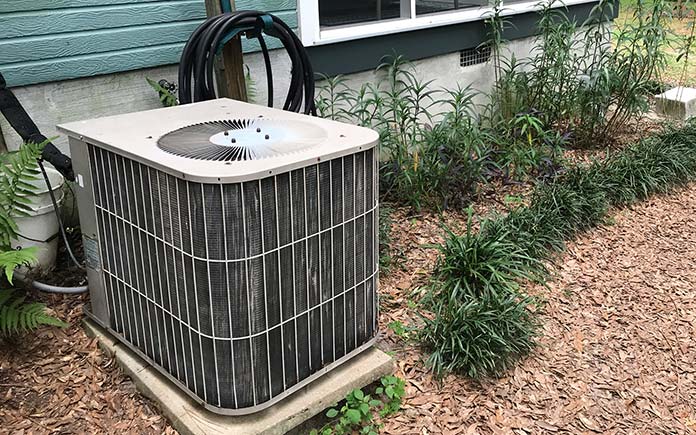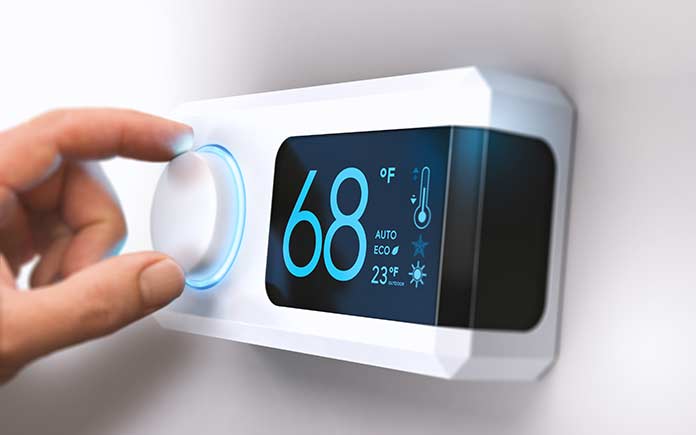Maintaining a home’s HVAC system is important for both energy efficiency and your comfort. Even the best heating and cooling systems can malfunction or waste energy if you don’t properly maintain them.
While some HVAC maintenance tasks are simple enough for you to handle, others require the expertise of a trained professional. This article will cover maintenance tasks for different types of HVAC systems, along with key factors to consider when hiring a professional or buying a new system.

Routine Maintenance for Common HVAC Systems
Regular maintenance is essential for keeping HVAC systems running efficiently. Different types of systems have varying maintenance needs, but they all need regular attention to function properly. Here’s a breakdown of maintenance requirements for common types of HVAC systems:
Heat Pump
Heat pumps are adaptable systems that offer both heating and cooling. They typically require:
- Annual service calls by an HVAC technician
- Belt checks and replacements as needed
- Filter checks and replacements
- Lubrication of moving parts
- Wiring inspections
- Thermostat calibration
Gas-Fired Furnace
Gas furnaces are common in many homes and have relatively simple maintenance requirements:
- Change the furnace filter every month or two during the heating season
- Oil the circulating fan annually
- Get a professional checkup every other year to make burner adjustments, Inspect and clean the gas line and burners, and inspect the heat exchanger, flue, and ducts
Oil-Fired Boiler
Oil-fired boilers need an annual visit from an HVAC technician to:
- Clean the flue
- Change the fuel filter
- Clean and adjust the fuel jets
- Check the oil tank for leaks
- Verify the pressure relief valve and expansion tank

Air Conditioner
Air conditioning units generally need less maintenance than heating systems. At the beginning and end of each cooling season, you should:
- Clean or replace air filters
- Vacuum out the unit
- Lubricate the motor
- Have a professional check refrigerant pressure if the unit isn’t cooling properly
- Clear debris around the exterior unit to ensure proper airflow

What To Look for When Hiring an HVAC Company
When it comes time to hire a professional HVAC company, do your research, considering these important factors:
Expertise and Services
Look for HVAC companies that design, install, and service the type of system you have in your home. Full-service companies tend to be up to date on the latest developments in the field and should be able to handle everything from minor repairs to full system installations. Ask companies about the type and extent of training their technicians get.
A quality provider will have an emergency number staffed 24/7 and enough technicians to respond quickly, even during peak season. They should also have a strong focus on continuing education for their staff to stay current with industry standards.
Insurance and Recommendations
Before hiring, check that the company has liability insurance and workers’ compensation policies. Ask for recommendations from neighbors, friends, and family who have used a specific company over several years. Ask questions such as these to get the best insight from recommenders:
- Did the technicians leave the working area clean?
- How quickly did the company respond to emergencies?
- Were service people punctual when you called with a problem?
- How well did their system run under the company’s care?
Customer Service and Transparency
Look into the company’s customer service. Are they easy to reach? Do they provide clear, written estimates? Transparency in pricing and services is critical to building trust.
A quality provider will have an emergency number that’s staffed 24 hours a day, seven days a week, and enough technicians to respond when the weather is awful and calls pile up.

Buying a New HVAC System
According to Angi, heating and cooling equipment typically lasts 15 to 20 years and sometimes longer. If your system is coming to the end of its useful lifespan, it might be time to consider replacing it. While replacing HVAC equipment is a major expense, modern systems operate much more efficiently than older units, bringing you energy savings.
Finding the Right HVAC Contractor
Most HVAC contractors specialize in designing and installing systems from a few manufacturers. To find a knowledgeable and service-oriented contractor:
- Ask neighbors, friends, and family for recommendations.
- Meet with at least two contractors.
- Choose someone who installs products from at least two manufacturers.
- Include your current HVAC service company, if applicable, in your search.
A good contractor will provide a portfolio of past installations and references from satisfied customers.
Key Factors in System Design
When choosing a contractor, remember that proper sizing of an HVAC unit requires skill and experience. Poor design can result in inconsistent temperatures and higher operating costs—and can even lead to dangerous backdrafting situations.
Comparing Estimates and Making a Decision
Once you’ve received itemized estimates for new HVAC systems, compare costs and research the equipment being proposed. Useful resources include U.S. Department of Energy guidance on HVAC systems.
Look at operating efficiency, costs, and reliability as gauged by customer reviews. Then factor in the information you’ve gathered about specific contractors to make an informed decision. Consider not only initial costs but also projected long-term savings from improved energy efficiency.
Essential Services To Look For When Hiring an HVAC Contractor
Any contractor you’re evaluating should provide the following:
Heat Loss Calculation
This process estimates the BTU capacity needed to heat or cool a home. The calculation should include the amount and type of insulation in walls and the attic. It should also include the type, number, and location of windows and doors, the orientation of the home and windows to the sun, and the local climate and seasonal temperature changes.
Energy Advice
A good contractor will advise on energy efficiency upgrades that may allow for a smaller HVAC unit. While the most energy-efficient unit may not always be the most cost effective, your system should meet minimum standards. These include an AC unit (below five tons) with 14 SEER or higher, a high-efficiency natural gas heater with AFUE around 90%, a fuel-oil burner with AFUE around 85%, and a heat pump with 14 SEER and 8.2 HSPF.
HVAC contractors may also suggest energy efficiency improvements such as insulation, window upgrades, or sealing ductwork.

Automatic Controls
According to Angi, programmable electronic or setback thermostats can cost around $20 to $150 (without installation cost). They can improve energy efficiency and comfort by enabling scheduled temperature adjustments. Some models offer remote control via smartphone apps or integration with home automation systems.
Payback Calculations
Quality HVAC contractors will provide payback calculations for different systems, estimating seasonal operating costs based on regional heating or cooling load, heating or cooling capacity of units you’re considering, cost of different energy types, and potential savings from energy improvements.
Warranty and Service Agreements
When investing in a new HVAC system, consider the warranty and service agreements the contractor offers. Good warranties cover parts and labor over a number of years. Service agreements should provide for regular maintenance check-ups and may include repair discounts.
Final Thoughts About Dealing with HVAC Professionals
Dealing with heating and cooling experts doesn’t have to be difficult. By understanding the basics of HVAC maintenance, knowing what to look for in a reputable company, and being prepared when it’s time to buy a new system, you can ensure you’re making informed decisions about your home’s comfort and energy efficiency.
Remember, regular maintenance and timely professional intervention can extend the life of an HVAC system and keep it running at peak efficiency. When it’s time to buy a new system, do your research and choose the right contractor.










